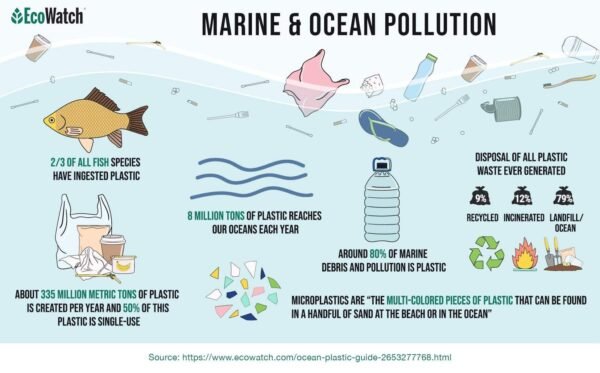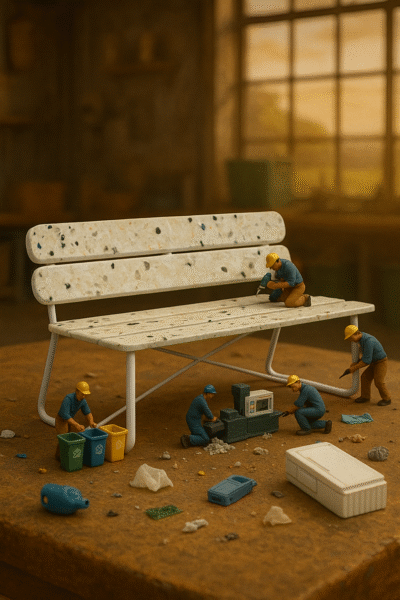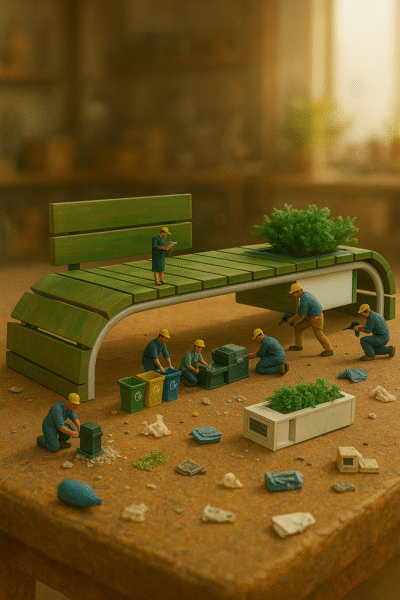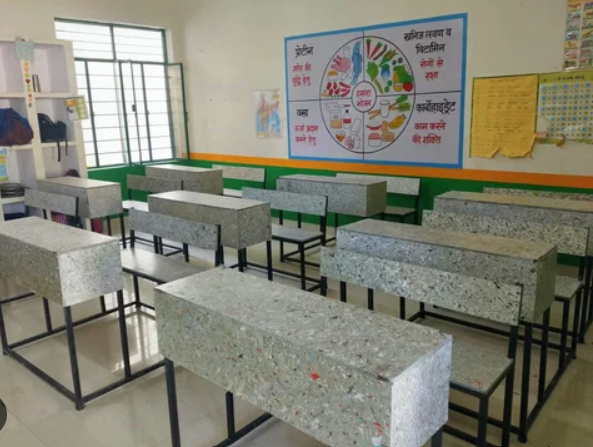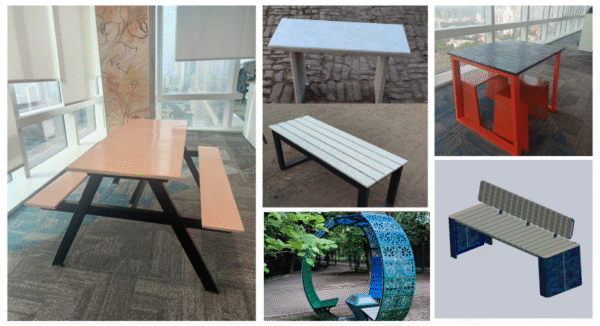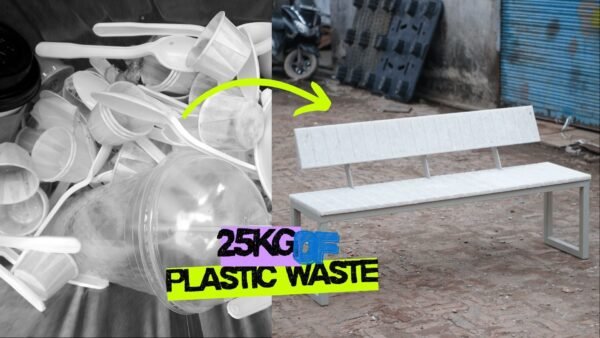Imagine walking into a park or a schoolyard and sitting on a bench that was once a plastic bottle, a food wrapper, or even an old bucket. It sounds impossible — but that’s exactly what we do at Minus Degre.
Our recycled plastic benches are not just furniture. They’re symbols of change. Of hope. Of a world where waste is not the end of the story — it’s the beginning.
🧠 The Plastic Problem We Can’t Ignore
Did you know the world generates more than 400 million tonnes of plastic waste every year? In India alone, we throw away over 3.5 million tonnes annually, and a major part of it ends up in landfills, rivers, or oceans — where it stays for hundreds of years.
At Minus Degre, we asked a simple question: What if we could turn that problem into a solution?
🪑 A Bench With a Mission: Redesigning Public Spaces Sustainably
That’s how our journey began — with the vision to create eco-friendly outdoor benches from 100% recycled plastic waste. These aren’t ordinary benches. Each one is crafted from 30–50 kilograms of plastic that would’ve polluted our planet.
Features of our recycled benches:
- Water-proof, termite-proof, and weather-resistant
- Maintenance-free and splinter-free
- Stronger and more durable than wood or metal
- Designed for parks, gardens, schools, public spaces, and urban infrastructure

These sustainable outdoor seating solutions don’t just reduce plastic waste — they save trees, reduce carbon emissions, and last for decades.
🏫 Revolutionizing School Furniture in India
Across many parts of India, children still sit on the floor due to a lack of proper infrastructure. Wooden benches break. Metal ones rust. The result? Discomfort, distraction, and disinterest in learning.
Minus Degre’s recycled plastic school benches are changing that. Our mission is to provide eco-friendly school furniture that is:
- Ergonomically designed for kids
- Brightly coloured to make classrooms more inviting
- Safe, hygienic, and child-friendly
- 100% sustainable and recyclable
These benches aren’t just for sitting — they spark conversations. They teach children about plastic recycling, climate responsibility, and circular economy solutions — just by being in the room.
🌱 Why Choose Recycled Plastic Furniture?
Because it matters.
When you choose a recycled plastic bench, you’re:
- Saving dozens of kilograms of plastic from landfills and oceans
- Supporting a circular economy
- Promoting sustainability in public infrastructure
- Reducing your carbon footprint
- Being part of a movement that turns waste into impact
Our recycled furniture is not just green in colour — it’s green in action.
💚 Built by Minus Degre. Backed by Impact.
At Minus Degre, we’ve already diverted over 250 tons of plastic waste from the environment. We’ve partnered with schools, city councils, architects, and sustainable builders to create meaningful furniture that makes a visible difference.
We are proud to be one of India’s pioneers in manufacturing recycled plastic furniture — from eco-panels and wall cladding to
trophies, medals, and now — benches with a story.
🔁 It’s More Than Just a Bench
Every time someone sits on one of our benches, they’re sitting on a solution. On hope. On the idea that plastic doesn’t have to be a problem — it can be part of the solution.
Let’s build parks that protect the planet. Let’s furnish schools that inspire young minds. Let’s create public spaces that prove waste can have worth.
📢 Bring Minus Degre to Your School or City
Are you a school administrator, architect, CSR head, city planner, or simply a citizen who cares?
Now is the time to invest in eco-friendly outdoor furniture and make your spaces meaningful.
✅ Explore our full range of recycled plastic school benches
✅ Choose sustainable outdoor benches for parks and gardens
✅ Customize your own seating with eco-friendly materials made in India
Ready to sit on the change you want to see in the world?
Reach out to us at www.minusdegre.com and let’s turn waste into wonder — one bench at a time.
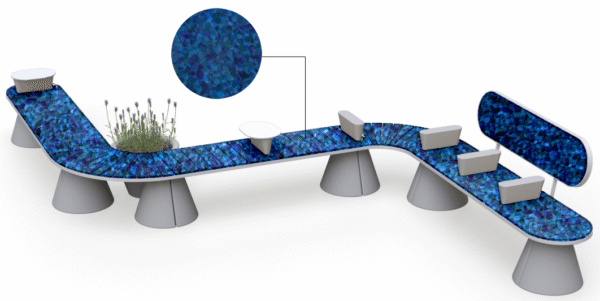
FAQ
1. What is the difference between recycling and upcycling?
Recycling involves breaking down waste materials into raw form to create new products, often with some loss in quality.
Upcycling transforms waste into products of higher value or quality without breaking them down — like turning plastic wrappers into durable furniture.
At Minus Degre, we do both — we upcycle and recycle plastic waste to create high-quality, functional products like benches and eco-panels.
2. Are bioplastics really eco-friendly?
Not always. While bioplastics are made from renewable resources like corn or sugarcane, they often need industrial composting and may still leave microplastics behind.
In contrast, recycling existing plastic waste (like we do at Minus Degre) helps clean up our environment and reduce existing pollution.
3. Why should we recycle plastic instead of burning it?
Burning plastic releases toxic gases like dioxins and furans, contributing to air pollution and health risks.
Recycling or upcycling plastic saves energy, reduces landfill waste, and gives plastic a second life — like in our recycled school and outdoor benches.
4. How much plastic waste does India generate?
India generates over 3.5 million tonnes of plastic waste every year. Only about 60% of it is recycled, and the rest ends up polluting rivers, landfills, and oceans.
Minus Degre is working to close this gap by converting plastic waste into valuable products and furniture.
5. Can fabric waste also be recycled like plastic?
Yes, fabric waste, especially synthetic fabrics like polyester, can be recycled or upcycled.
At Minus Degre, we are also exploring textile upcycling solutions to turn post-consumer fabric waste into eco-friendly products for interiors and gifting.
6. Is recycled plastic furniture safe and durable?
Absolutely! Our recycled plastic benches are:
- Stronger than traditional wood or metal
- Resistant to weather, rust, and termites
- Non-toxic and child-safe
- Long-lasting (up to 20 years or more)
7. How can schools and cities benefit from recycled plastic furniture?
Schools and cities can reduce their carbon footprint, lower furniture maintenance costs, and support sustainable development goals by switching to eco-friendly school furniture and recycled outdoor benches.
It’s not just furniture — it’s a statement of responsibility.
8. What is a circular economy, and how does Minus Degre support it?
A circular economy is a system where waste is reused or recycled to make new products, reducing the need for virgin materials.
Minus Degre is built on circular economy principles — by collecting plastic waste and transforming it into second-life materials like eco-panels, trophies, and benches.
9. Can I get custom recycled plastic products for my brand or event?
Yes! We offer custom recycled furniture, eco-friendly awards, gifting hampers, and bespoke solutions for sustainable spaces and events.
Whether you’re a brand, school, NGO, or corporation — we’ll help you build with purpose.


